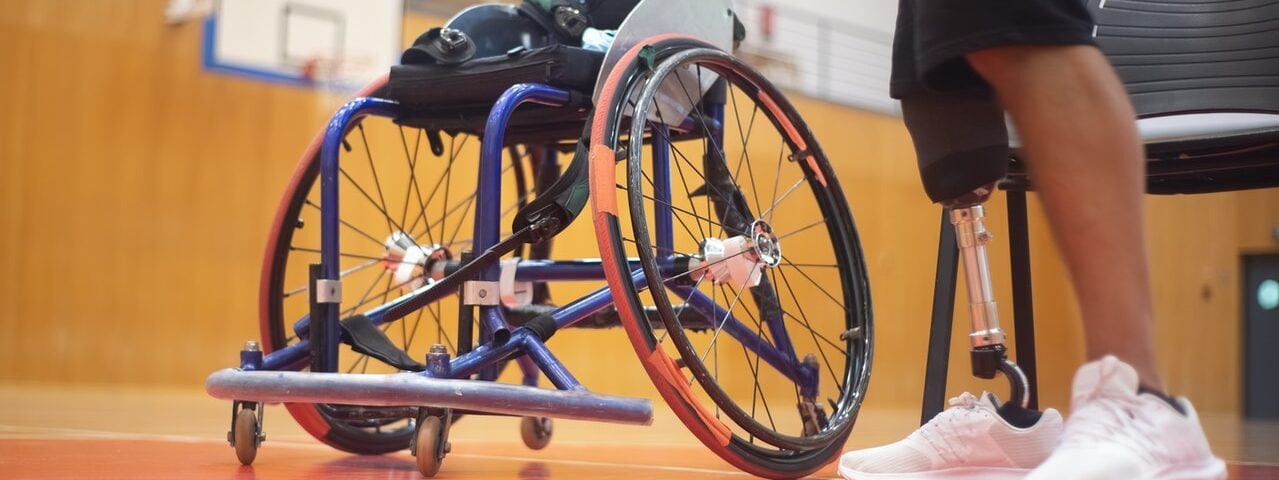
Now that May, the month for diversity and inclusion, is over, it’s a good time to talk about disability. We must remember that people with disabilities can, if given the opportunity, contribute and be part of society like everyone else. The key is to learn to respect and value the inclusion of diversity.
Due to the severity of their disability, many people do not have the same adaptive abilities. It’s true that awareness and the number of centers and therapies available are increasing, new laws and assistance are being added, foundations and associations are being created…. But even today, there is still a lot to learn about raising awareness in society. Good education and knowledge could break down barriers in order to promote more integration and blur the line between those who have disabilities and those who don’t.
What is disability?
Disability is one of those things we don’t even think about or recognize if we’ve not been impacted by it. Or maybe we don’t want to think about it. It’s not that our intentions are evil, we’re just indifferent. It doesn’t have anything to do with us. We all have our problems, our own lives, and it’s hard to empathize with something we know nothing about and that reflects pain and suffering. It’s probably one of the most complicated situations to empathize with. They’re not situations we have experienced or that are common. It’s not something we all necessarily experience in our lives. It’s highly complicated to walk in the shoes of someone who has become paraplegic in an accident. Or a blind person. Or with the parents of a child on the autism spectrum.
No one wants disability in their own life or that of their loved ones, but those who live with it say that, when it hits home, it awakens a sixth sense, a new vision that lets you see things you didn’t see before, barriers that were not there before, and a different way of relating to the world.
Deep ignorance about disability and not knowing how to relate to people who live with it can create distancing and social marginalization, even when that’s not the intention. Most of the time, it’s enough to use common sense to improve our communication and interactions. For example:
- Acting naturally and avoiding any differences in treatment or paternalism.
- Listening carefully and offering our help when it is needed.
- Making them part of our daily conversations and activities.
To put these ideas into practice, though, you have to put yourself out there.
How to learn from disability
A few months ago, I attended a presentation on the book, Cómo aprender de la discapacidad de tu hijo (How to Learn from Your Child’s Disability), by Gonzalo Bermejo. In addition to Javier Remón (a work colleague), the mother of a girl with Down’s Syndrome participated in the presentation; her message to the audience stuck in my mind: “Let yourself be touched by disability.” I am convinced of the benefits of this friction she proposed for both parties, but I would say that both the benefits and the learning are even greater for those who do not suffer from disability in our own lives. Here are some of the ones I find important:
- Disability can affect all of us – at any time, when we least expect it. In fact, according to the WHO, “about 15% of the world’s population have some form of disability, and almost everyone is likely to experience some form of disability – whether temporary or permanent – at some point in their lives.” And when it does, it’s a hurricane that sweeps in and changes everything. Learning to value, be grateful for, and enjoy “normality,” the little things on a daily basis is something we’re not used to in our fast-paced lives. A character in a book by Marta Rivera de la Cruz says, “I was happy, and I didn’t know it.” Don’t wait for things to change to enjoy them.
- Relativize your problems. Even if you think things are pretty bad, there are always other people who are worse off than you. A lot of people are much worse off. The father of a child with a serious disability once told me that he was convinced that his child had the worst, most serious condition a child could have…until he went to the first day of class at the special education school. That was where he stumbled upon reality. Álvaro Villanueva recounts it well in this article, where he writes a letter to his disabled son. Sometimes, you have to have perspective with problems so as not to absolutize them.
- How you deal with challenges, problems, and obstacles every day is up to you. It’s one of the few things that is only up to you. Sara Andrés, a teacher and athlete, had both of her legs amputated after an accident at the age of 25, and she holds on to humor as a vital attitude, saying, “There’s nothing more fun than laughing at yourself.”
- Deal with the present; don’t let yourself get overwhelmed with concern for the future. The main worry of a mother or father with a child with a disability is the question, “What will happen to my child when I am not there?” But life goes on, and some decisions have to be made today. It’s about doing the best thing possible today. Every day is a micro-life ahead of you. You can’t change the past, and you can’t control the future.
- Instead of asking why something happened, ask what can be done with it. When disability or any other setback appears, this shift in the question is critical. As you can read in this post, “With this type of question – why? – and its possible answers, there’s not much we can do. In fact, the only result we get is that they pin us down in rumination and spiraling thoughts and emotions that end up wearing us down. It doesn’t make us move forward or learn. Perhaps it is more beneficial to ask a different question instead: “What’s the reason this is happening to me?” Vital setbacks usually augment our well-being when we take them as an opportunity to learn, when we choose to give them that meaning.”
- Ask for help, and let yourself receive that help. One of the lessons that have become clear to us all over the course of the pandemic is the awareness of vulnerability. We have seen that we are more fragile than we thought in many aspects of our lives and that we need others (and others need us) in difficult times. It’s okay to raise your hand and ask for help. The sooner you do, the better.
In your life, it may be difficult to help or interact with people with disabilities.
Disability in film
In that case, another way to change our perspective, get closer to their reality, and empathize with them can be through film. Here are five movie recommendations from the past decade that look at disability (physical, cognitive, or sensory) from different points of view:
- The Intouchables (2011) IMDb 8.5/10. 38 awards and 40 nominations in all. A French film by directors Olivier Nakache and Eric Toledano about an aristocrat who becomes a quadriplegic after a paragliding accident and hires a young man from a poor neighborhood to be his caretaker.
- Wonder (2017). IMDb 7.9/10. 5 awards and 28 nominations (including 1 Oscar). American film where Julia Roberts and Owen Wilson play the parents of Auggie Pullman, a child with a facial deformity who is going into fifth grade at a conventional elementary school for the first time.
- Champions (2018): IMDb 7.2/10. 13 awards and 31 nominations. Spanish film by director Javier Fesser and actor Javier Gutiérrez, who plays the assistant coach of a basketball team who, after a brawl with the head coach and a car accident, is forced to complete 90 days of community service by training a team of individuals with intellectual disabilities.
- The Specials (2019): IMDb 7.4/10. 2 awards and 9 nominations. Directors Olivier Nakache and Eric Toledano are back with the story of two educators working with children and adolescents with autism.
- CODA (2021) IMDb 8/10. 61 awards – including 3 Oscars – and 133 nominations. A remake of the French-Belgian film The Belier Family (2014): IMDb 7.3/10 8 awards and 11 nominations. – about a girl who lives with her deaf parents and discovers that she has a knack for singing.
Earlier this year, at an event with doctors and medical students, one of the speakers confessed to me that the best people he had met in his life were sick people, people with disabilities and their families. People who were exposed to pain, suffering, and indifference, but who are still happy and brighten up the lives of those around them. People living with disabilities and their families deserve all of society’s respect and admiration, as well as a little extra effort from everyone to make their daily lives as easy as possible and give back everything they show us by their example. As they say in the movie Black Hawk Down, “Nobody asks to be a hero, it just sometimes turns out that way.”





There are no comments yet